-
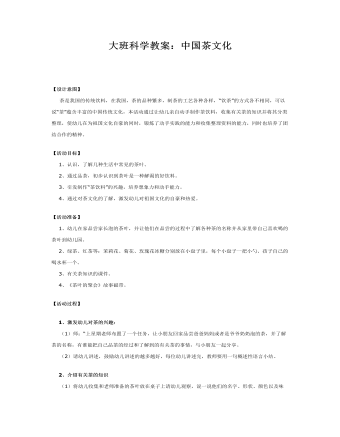
大班科学教案:中国茶文化
【活动目标】 1、认识,了解几种生活中常见的茶叶。 2、通过品茶,初步认识到茶叶是一种解渴的好饮料。 3、引发制作“茶饮料”的兴趣,培养想象力和动手能力。 4、通过对茶文化的了解,激发幼儿对祖国文化的自豪和热爱。【活动准备】 1、幼儿在家品尝家长泡的茶叶,并让他们在品尝的过程中了解各种茶的名称并从家里带自己喜欢喝的茶叶到幼儿园。 2、绿茶、红茶等:茉莉花、菊花、玫瑰花冰糖分别放在小盘子里,每个小盘子一把小勺、孩子自己的喝水杯一个。 3、有关茶知识的课件。 4、《茶叶的聚会》故事磁带。【活动过程】 1、激发幼儿对茶的兴趣: (1)师:“上星期老师布置了一个任务,让小朋友回家品尝爸爸妈妈或者是爷爷奶奶泡的茶,并了解茶的名称,有谁能把自己品茶的经过和了解到的有关茶的事情,与小朋友一起分享。 (2)请幼儿讲述,鼓励幼儿讲述的越多越好,每位幼儿讲述完,教师要用一句概述性语言小结。
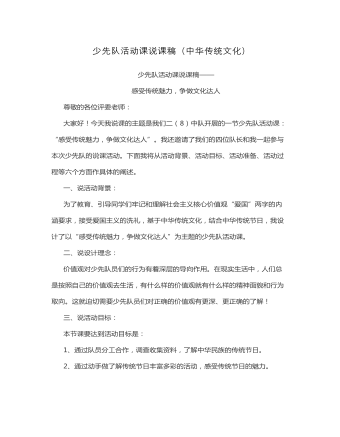
少先队活动课说课稿(中华传统文化)
尊敬的各位评委老师:大家好!今天我说课的主题是我们二(8)中队开展的一节少先队活动课:“感受传统魅力,争做文化达人”。我还邀请了我们的四位队长和我一起参与本次少先队的说课活动。下面我将从活动背景、活动目标、活动准备、活动过程等六个方面作具体的阐述。一、说活动背景:为了教育、引导同学们牢记和理解社会主义核心价值观“爱国”两字的内涵要求,接受爱国主义的洗礼,基于中华传统文化,结合中华传统节日,我设计了以“感受传统魅力,争做文化达人”为主题的少先队活动课。二、说设计理念:价值观对少先队员们的行为有着深层的导向作用。在现实生活中,人们总是按照自己的价值观去生活,有什么样的价值观就有什么样的精神面貌和行为取向。这就迫切需要少先队员们对正确的价值观有更深、更正确的了解!三、说活动目标:本节课要达到活动目标是:1、通过队员分工合作,调查收集资料,了解中华民族的传统节日。2、通过动手做了解传统节日丰富多彩的活动,感受传统节日的魅力。3、基于传统文化小达人的评比,激发队员们对传统节日的热爱,增强对传统节日的亲近感。教学重点是引导队员们通过合作互动了解中华传统节日,培养爱国意识。难点是让队员对“爱国”这一抽象的价值观内化成感性的认知。四、说活动准备:辅导员:少先队员是少先队活动课的主体,因此本堂课前作为辅导员,在本堂课前主要准备收集各项资料,制作相关教案课件,起到引导作用。队员们则分成四支小队在准备期通过自主合作进行了充分的准备,并在课堂中做了精彩的展示。
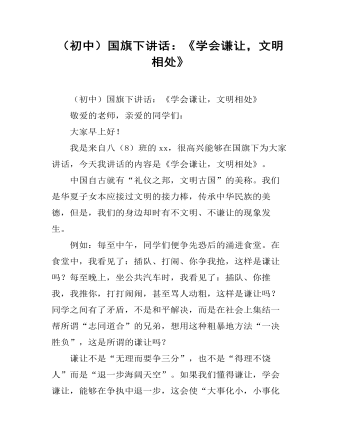
(初中)国旗下讲话:《学会谦让,文明相处》
中国自古就有“礼仪之邦,文明古国”的美称。我们是华夏子女本应接过文明的接力棒,传承中华民族的美德,但是,我们的身边却时有不文明、不谦让的现象发生。例如:每至中午,同学们便争先恐后的涌进食堂。在食堂中,我看见了:插队、打闹、你争我抢,这样是谦让吗?每至晚上,坐公共汽车时,我看见了:插队、你推我,我推你,打打闹闹,甚至骂人动粗,这样是谦让吗?同学之间有了矛盾,不是和平解决,而是在社会上集结一帮所谓“志同道合”的兄弟,想用这种粗暴地方法“一决胜负”,这是所谓的谦让吗?
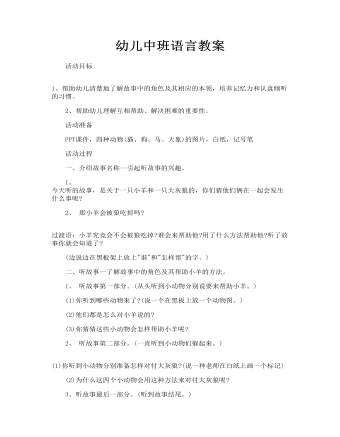
幼儿中班语言教案
一、介绍故事名称--引起听故事的兴趣。 1、 今天听的故事,是关于一只小羊和一只大灰狼的,你们猜他们俩在一起会发生什么事呢? 2、 那小羊会被狼吃掉吗? 过渡语:小羊究竟会不会被狼吃掉?谁会来帮助他?用了什么方法帮助他?听了故事你就会知道了? (边说边在黑板架上放上"谁"和"怎样帮"的字。)
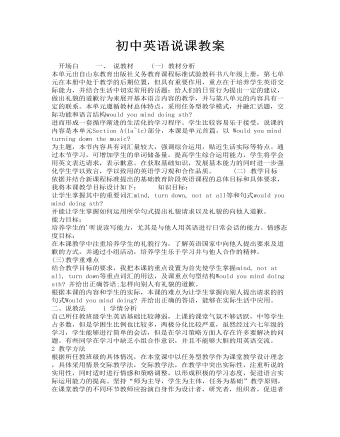
初中英语说课教案
(二) 教学目标 依据并结合新课程标准提出的基础教育阶段英语课程的总体目标和具体要求,我将本课教学目标设计如下: 知识目标: 让学生掌握其中的重要词汇mind, turn down, not at all等和句式would you mind doing sth? 并能让学生掌握如何运用所学句式提出礼貌请求以及礼貌的向他人道歉。
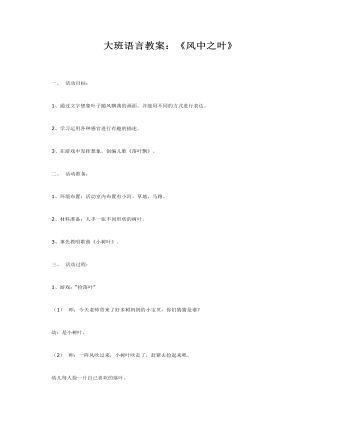
大班语言教案:《风中之叶》
2、学习运用各种感官进行有趣的描述。3、在游戏中发挥想象,创编儿歌《落叶飘》。二、 活动准备:1、环境布置:活动室内布置有小河、草地、马路。2、材料准备:人手一张不同形状的树叶。3、事先教唱歌曲《小树叶》。三、 活动过程:1、游戏:“捡落叶”(1) 师:今天老师带来了好多树妈妈的小宝贝,你们猜猜是谁?幼:是小树叶。(2) 师:一阵风吹过来,小树叶吹走了,赶紧去捡起来吧。幼儿每人捡一片自己喜欢的落叶。(3) 请幼儿描述一下自己的落叶长得什么样?并用形体动作表现出叶子的造型。(长长的、宽宽的、尖尖的、圆圆的、破一个洞的------)
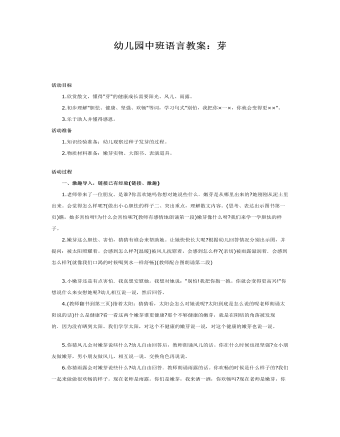
幼儿园中班语言教案:芽
2.初步理解"胆怯、健康、坚强、欢畅"等词,学习句式"别怕,我把你×一×,你就会变得更××"。3.乐于助人并懂得感恩。活动准备1.知识经验准备:幼儿观察过种子发芽的过程。2.物质材料准备:嫩芽实物、大图书、表演道具。活动过程 一、激趣导入,链接已有经验(链接、激趣)1.老师带来了一位朋友。是谁?你喜欢她吗你想对她说些什么.嫩芽是从哪里出来的?她刚刚从泥土里出来。会觉得怎么样呢?(做出小心胆怯的样子二、突出重点,理解散文内容。(思考、表达出示图书第一页)瞧,她多害怕呀!为什么会害怕呢?(教师有感情地朗诵第一段)嫩芽像什么呀?我们来学一学胆怯的样子。2.嫩芽这么胆怯、害怕,猜猜有谁会来帮助她。让她快快长大呢?根据幼儿回答情况分别出示图,并提问:被太阳照耀着。会感到怎么样?(温暖)被风儿抚慰着,会感到怎么样?(亲切)被雨露滋润着.会感到怎么样?(就像我们口渴的时候喝到水一样舒畅)(教师配合图朗诵第二段)
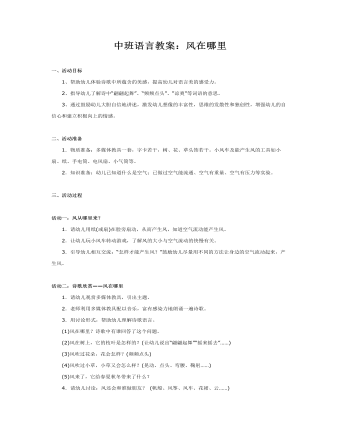
中班语言教案:风在哪里
二、活动准备1.物质准备:多媒体教具一套,字卡若干,树、花、草头饰若干。小风车及能产生风的工具如小扇、纸、手电筒、电风扇、小气筒等。2.知识准备:幼儿已知道什么是空气;已做过空气能流通、空气有重量、空气有压力等实验。 三、活动过程 活动一:风从哪里来?1.请幼儿用纸(或扇)在脸旁扇动,从而产生风,知道空气流动能产生风。2.让幼儿玩小风车转动游戏,了解风的大小与空气流动的快慢有关。3.引导幼儿相互交流:“怎样才能产生风?”鼓励幼儿尽量用不同的方法让身边的空气流动起来,产生风。
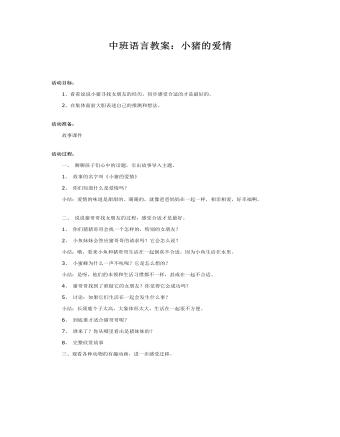
中班语言教案:小猪的爱情
活动准备: 故事课件活动过程: 一、聊聊孩子们心中的话题,引出故事导入主题。1、故事的名字叫《小猪的爱情》2、你们知道什么是爱情吗? 小结:爱情的味道是甜甜的、暖暖的,就像爸爸妈妈在一起一样,相亲相爱,好幸福啊。 二、说说猪哥哥找女朋友的过程,感受合适才是最好。1、你们猜猪哥哥会找一个怎样的,特别的女朋友?2、小鱼妹妹会答应猪哥哥的请求吗?它会怎么说? 小结:哦,看来小鱼和猪哥哥生活在一起倒真不合适,因为小鱼生活在水里。

中班语言教案:大树和小鸟
2、初步学习按诗歌的结构仿编诗歌。 准备: 图片。 过程:一、游戏:大树和小鸟。——教师扮演大树,幼儿扮演一群小鸟。引导幼儿在大树周围做各种动作,如亲亲大树、摸摸大树、在大树旁跳舞、为大树捉虫等。——大树和小鸟在一起开心吗?有一首诗歌讲的就是“大树和小鸟”的事情。
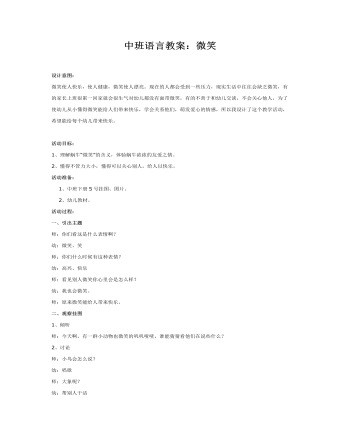
中班语言教案:微笑
活动目标:1、理解蜗牛“微笑”的含义,体验蜗牛浓浓的友爱之情。2、懂得不管力大小,懂得可以关心别人,给人以快乐。活动准备: 1、中班下册5号挂图、图片。 2、幼儿教材。活动过程:一、引出主题师:你们看这是什么表情啊?幼:微笑、笑师:你们什么时候有这种表情?幼:高兴、快乐师:看见别人微笑你心里会是怎么样?幼:我也会微笑。师:原来微笑能给人带来快乐。

中班语言教案鹅妈妈买鞋
2. 学习和同伴合作开展游戏,并能从中干支速度和时间的关系。活动准备:自制鞋子,袜子,花裙,项链,香水及鹅妈妈头饰若干活动过程:一.出示鹅妈妈形象,引入故事1.引导幼儿观察原先的鹅妈妈T:小朋友看今天老师带来了什么啊?(一只鹅)T:鹅妈妈漂不漂亮?为什么?(不漂亮,因为它光着脚,腿毛长,腰很粗,脖子长)T:今天天气真好,鹅妈妈想上街去买点东西,可是她想买什么呢?让我们一起来听。

中班语言教案诗歌《家》
2、鼓励幼儿根据儿歌提供的线索,尝试初步创编儿歌的兴趣。准备:1、背景图 2、白云、小鸟、小羊、小鱼、蝴蝶每人一个 3、天空、树林、草地、河水、幼儿园过程:引入主题1、今天老师给你们带来了新朋友,2、你们想知道他们是谁吗?3、对了你们说对了,4、现在就让我们这些好朋友起一做个游戏吧。5、你们玩完乐也累了,6、现在听音乐找到自己的家。教儿歌7、你们都找到了自己的家,8、现在我们帮助他们也找到自己的家好吗?
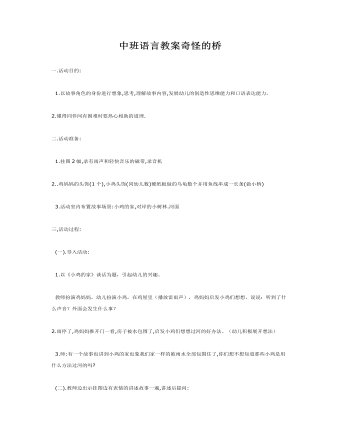
中班语言教案奇怪的桥
二.活动准备: 1.挂图2幅,录有雨声和轻快音乐的磁带,录音机2..鸡妈妈的头饰(1个),小鸡头饰(同幼儿数)硬纸板做的乌龟数个并用鱼线串成一长条(做小桥) 3.活动室内布置故事场景:小鸡的家,对岸的小树林.河面三,活动过程: (一).导入活动: 1.以《小鸡的家》谈话为题,引起幼儿的兴趣。 教师扮演鸡妈妈,幼儿扮演小鸡,在鸡屋里(播放雷雨声),鸡妈妈启发小鸡们想想,说说:听到了什么声音?外面会发生什么事?2.雨停了,鸡妈妈推开门一看,房子被水包围了,启发小鸡们想想过河的好办法。(幼儿积极展开想法)

中班语言教案《动物的雨伞》
设计意图:《动物的雨伞》是一首充满童趣的诗歌,它是我自行创编而成的。诗歌运用质朴的语言,分别描绘了燕子、蚂蚁、青蛙、小鸡、瓢虫、乌龟、松鼠这些小动物在遇到下雨时,开动脑筋想出的各种躲雨好办法,这些小动物恰似一群天真、活泼、好动的孩子,充满了无限的欢乐和生机,这样的内容无疑是幼儿熟悉和喜爱的。在自行创编诗歌过程中我汲取了有丰富经验的老师的建议,使自编的诗歌表现出句式整齐、生动浅显,音韵和谐的特点。 《幼儿园指导纲要(试行)》中提出“要为幼儿创造一个自由、宽松的语言交往环境”、“语言能力是在运用的过程中发展起来的,发展幼儿语言的关键是创设一个能使他们想说、敢说、喜欢说、有机会说并能得到积极应答的环境。”

中班语言课件教案:钓星星
2、 能完整的朗诵儿歌,并想象续编儿歌。 3、 喜欢探索宇宙的奥秘,初步形成观察天空、星星、月亮的好奇心。活动重点:目标1、2活动难点:能在图片的提示下大胆续编儿歌活动准备:多媒体课件、活动室布置成宇宙活动过程:1、 引语:“今天,我们也当一次宇航员。乘做自己的飞船到太空去旅游去,想去吗?2、 带幼儿随音乐做乘飞船动作进入布置成宇宙的活动室,引导幼儿仔细观察张贴的月亮、星星图片,发现月亮的形状(象钩)。3、 引“多漂亮的大月亮,走!咱们一起进去玩一玩!到月亮上作客我们要送什么礼物给月亮姐姐呢?我们看见了这么美的月亮,那就将月亮编成一首好听的儿歌送给月亮姐姐吧!同意吗?”
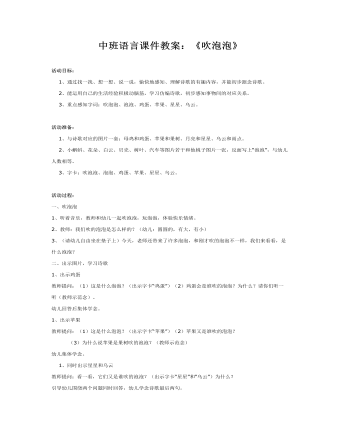
中班语言课件教案:《吹泡泡》
2、能运用自己的生活经验积极动脑筋,学习仿编诗歌,初步感知事物间的对应关系。 3、重点感知字词:吹泡泡、泡泡、鸡蛋、苹果、星星、乌云。 活动准备: 1、与诗歌对应的图片一套:母鸡和鸡蛋、苹果和果树、月亮和星星、乌云和雨点。 2、小蝌蚪、花朵、白云、贝壳、树叶、汽车等图片若干和他桃子图片一张,反面写上“泡泡”,与幼儿人数相等。 3、字卡:吹泡泡、泡泡、鸡蛋、苹果、星星、乌云。 活动过程:一、吹泡泡1、听着音乐,教师和幼儿一起吹泡泡,玩泡泡,体验快乐情绪。2、教师:我们吹的泡泡是怎么样的?(幼儿:圆圆的,有大,有小)3、(请幼儿自由坐在垫子上)今天,老师还带来了许多泡泡,和刚才吹的泡泡不一样,我们来看看,是什么泡泡?二、出示图片,学习诗歌1、出示鸡蛋教师提问:(1)这是什么泡泡?(出示字卡“鸡蛋”)(2)鸡蛋会是谁吹的泡泡?为什么?请你们听一听(教师示范念)。幼儿回答后集体学念。
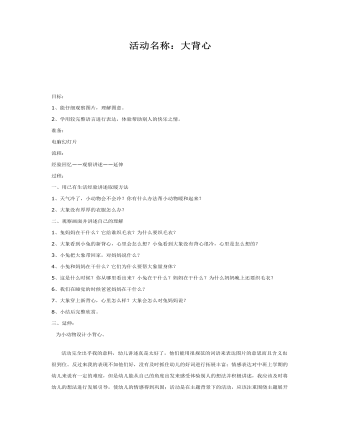
中班语言课件教案:大背心
2、学用较完整语言进行表达,体验帮助别人的快乐之情。 准备: 电脑幻灯片 流程: 经验回忆——观察讲述——延伸 过程: 一、用已有生活经验讲述取暖方法 1、天气冷了,小动物会不会冷?你有什么办法帮小动物暖和起来? 2、大象没有厚厚的衣服怎么办? 二、观察画面并讲述自己的理解 1、兔妈妈在干什么?它给谁织毛衣?为什么要织毛衣? 2、大象看到小兔的新背心,心里会怎么想?小兔看到大象没有背心很冷,心里是怎么想的?
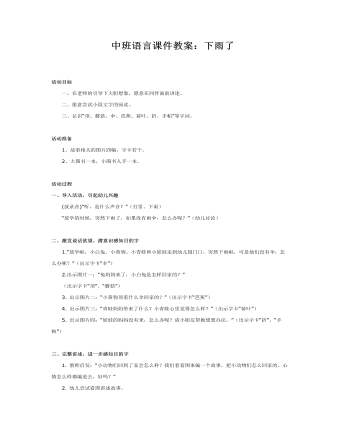
中班语言课件教案:下雨了
二、愿意尝试小段文字的阅读。 三、认识“顶、蘑菇、伞、芭蕉、荷叶、折、手帕”等字词。 活动准备1、故事相关的图片四幅,字卡若干。2、大图书一本,小图书人手一本。活动过程一、导入活动,引起幼儿兴趣(放录音)“听,是什么声音?”(打雷、下雨)“放学的时候,突然下雨了,如果没有雨伞,怎么办呢?”(幼儿讨论) 二、激发说话欲望,潜意识感知目的字1.“放学啦,小白兔、小黄狗、小青蛙和小娃娃走到幼儿园门口,突然下雨啦,可是他们没有伞,怎么办呢?”(出示字卡“伞”)2.出示图片一:“兔妈妈来了,小白兔是怎样回家的?” (出示字卡“顶”、“蘑菇”)3. 出示图片二:“小黄狗顶着什么伞回家的?”(出示字卡“芭蕉”)4. 出示图片三:“青蛙妈妈带来了什么?小青蛙心里觉得怎么样?”(出示字卡“荷叶”)5. 出示图片四:“娃娃的妈妈没有来,怎么办呢?请小朋友帮她想想办法。”(出示字卡“折”、“手帕”)

中班语言课件教案:荷花开
2、启发幼儿根据儿歌的内容想象并用动作来表演。活动准备:1、带幼儿认识荷花,知道荷花的生长过程。2、与儿歌相应的图片。活动过程:一、欣赏荷花,幼儿说说荷花的主要特点和生长过程1、师:荷花是长在什么地方的呀?荷花的叶子是怎样的?荷花池里还会有什么呢?2、幼儿根据自己的知识经验讲述。二、结合图片学习儿歌《荷花开》1、出示图片:图上有什么?(小鱼、小虾、小雨还有风儿和荷花)2、老师把这张图片上的内容编成了一首好听的儿歌,大家一起来听一听吧!

